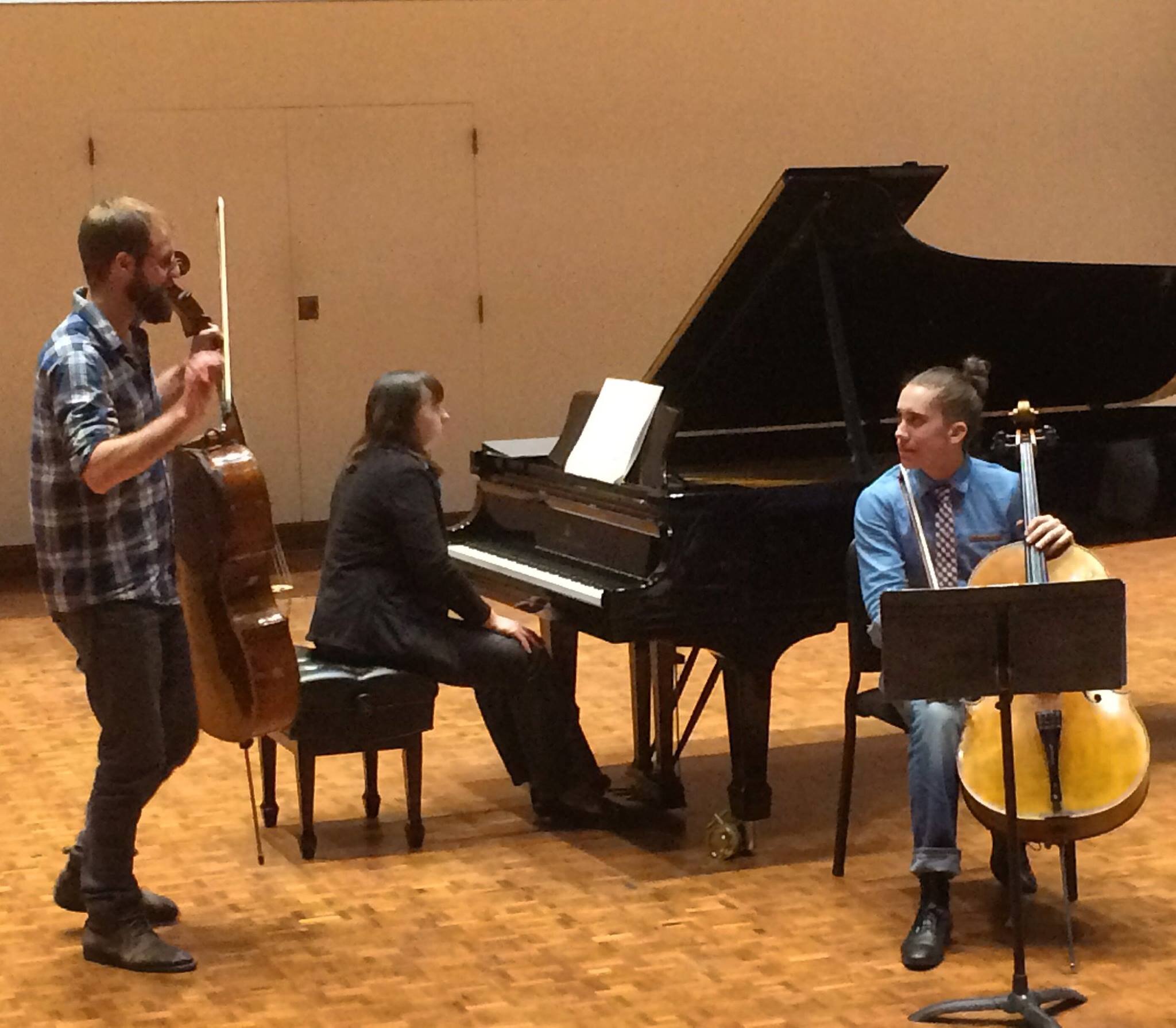
The Cello Studio
Having established himself as one of the leading cellists of his generation, Steuart traveled the world playing in renowned concert halls and guest teaching at leading musical institutions and universities. Recently he made the decision to return to his hometown in southwest Missouri to settle into a quieter life of teaching and farming. While still coaching and advising young professional performers globally via zoom, he now maintains a studio of private students, offering weekly private lessons along with a studio (group) class. You can read more about Steuart’s teaching experience and philosophy below, as well as apply for a trial lesson.
About the Onomatopoeia Cello Studio
Steuart’s studio in Springfield, Missouri is currently made up of intermediate-advanced high school students, college-level students and adult amateurs. Students are expected to commit to weekly lessons, daily practice of at least one hour, and attendance of at least three technique/scale classes (or the music comprehension class + two technique/scale classes) each month. In this way, Steuart's students progress quickly, many becoming leaders in their local musical communities. Studio class will sometimes involve a "field trip" where we from time to time learn from other local experts - drawing connections between their work as artists, craftsmen, and farmers and applying what we learn to our music making!
Steuart's students who have proven themselves to be dedicated in their work, are open to learning, and show significant progress may be selected to have additional zoom lessons with a cellist of the Onomatopoeia Guest Faculty.
Steuart is currently accepting students to his Onomatopoeia studio in Missouri who are ready to commit to serious learning, practice and growth, regardless of experience. Please complete the form at the bottom of this page to set up a trial lesson.
Steuart also maintains a global studio of advanced string players through virtual lessons. Steuart works with these students to prepare them for significant recordings or performances, Bach interpretation for professional modern string players, as well as general career mentorship. If you are interested in learning more about studying with Steuart from afar, please write to him directly.
Steuart’s Teaching Experience
Steuart’s teaching experience ranges from working with advanced middle school students to young professionals. Over the years, his students have gone on to attend leading music schools and conservatories as well as enjoy meaningful professional careers as chamber and orchestral musicians. He has served as Visiting Teacher at Oberlin Conservatory and has presented master classes and held residences at community music schools, arts high schools, universities, and conservatories across the U.S. including Peabody Institute, Lawrence Conservatory, Wheaton Conservatory, Biola University, University of California Dominguez Hills, Missouri State University, Texas Tech University, Baylor University, and Gordon College. For 10 years he was on faculty at the Credo Music festival (teaching ages 13-23) and for several years taught at the Crescendo Summer Institute in Hungary.
Steuart’s Teaching Philosophy
My philosophy of teaching can be summed up quite simply. Any student I am dealing with is a complex and beautiful being who I must carefully observe and listen to and consequently challenge and inspire. I am interested in developing the whole person. I strongly believe that the most wonderful and effective artists are those who have a meaningful life outside of their art form. A broad and flourishing life enhances the depth and diversity of the artist's resources for expression. I encourage all of my students to broaden their interests beyond music and use their musical gifting as a vehicle for communicating truth, goodness, and beauty in all areas of their lives!
To expand on my core philosophy, I have included below some specific elements of my own approach to teaching:
Imagination and Expression I have often encouraged my students to begin their practice with a little time dedicated to improvisation (that is, after the necessary warm-up). Improvisation requires the exercise of the imagination and helps the student learn their most immediate forms of expression for particular emotions. When we start our practice with pre-written information (i.e. a piece or etude), there are more layers to interfere with pure expression. However, a regular practice of personal expression through improvisation helps the student connect the dots between what a composer requests and their most natural ability to expressively satisfy that request.
Although my focus in teaching is generally the standard cello repertoire, I believe that engaging in other disciplines is also essential for developing imagination and expression in a musician. I encourage my students to collaborate with other artists, musicians of non-Western specialty, as well as experts in other disciplines to expand their world of expression.
Technical and Musical Facility Recognizing that playing the cello is already not the healthiest activity for our bodies, I am interested in helping students find the physically healthiest way to play the instrument that supports a mature and beautiful interpretation and presentation. Economy of motion is at the core of my technical teaching, but this is never at the expense of expressive gesture - all technique must serve musical expression!
A student must also be equipped with a strong musical and analytical facility. Students must be taught how to study a score, research the contextual background and respect the composer’s intent (insomuch as it can be understood). A constant and open dialogue between teacher and student on all such subjects is essential.
Individual and Collective The musical development of the student should serve their growth as a human being. The teacher must consider the goals, interests and abilities of each individual. Peer review is also crucial for individual development. Playing for and with fellow students in performance scenarios and technical exercises helps each student strengthen and solidify their own artistic voice. Healthy competition, challenging verbal critique, and encouragement among students are essential to the individual’s health and growth.
Apply for a trial lesson
If you are interested in a trial lesson for private cello studies, please send your details via the form found here:


